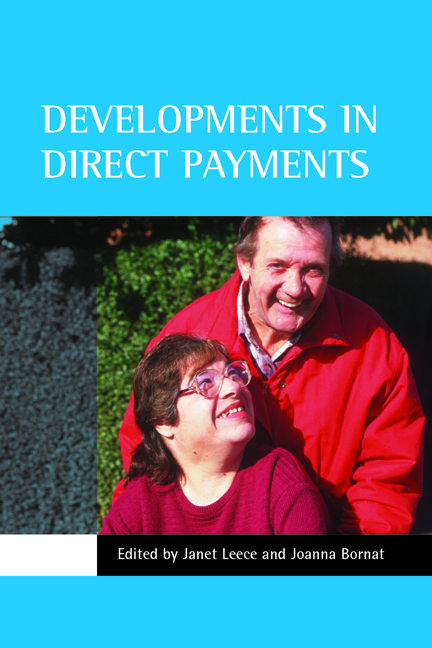Book contents
five - Direct payments and autonomy: issues for people with learning difficulties
Published online by Cambridge University Press: 18 January 2022
Summary
“I think independence is to be what you are. Independence is about your life.” (Kevin Smith, Swindon People First, 2000)
This chapter will focus on how people with learning difficulties have been able to gain access to direct payments, although in small numbers, and will explore evidence of the potential benefits for this group, especially in relation to the concept of independence. The chapter will draw on two main strands of work. One is an inclusive research project, in which people with learning difficulties did their own research about direct payments, with support from the Norah Fry Research Centre, University of Bristol. The other is the direct payments development and campaigning work, which was carried out by Values Into Action (Holman and Collins, 1997, 1999) from the time that the 1996 Community Care (Direct Payments) Act was first passed.
In the original draft direct payments legislation, people with learning difficulties were excluded, and this chapter will trace how and why this exclusion was challenged. The second part of the chapter will particularly focus on the two major problems for people with learning difficulties: one is to prove their ability to consent, and the other is to be able to manage the direct payment itself. As will be seen, people with learning difficulties and their supporters are exploring some innovative and effective solutions in both of these areas.
Background
From the very start of direct payments legislation with the introduction of the 1996 Act, the organisation called Values Into Action (VIA) was active in leading the way for people with learning difficulties. The series of ‘Funding Freedom’ reports and training resources (Holman, 1996; Holman and Collins, 1997, 1999) began with a conference on the eve of the passing of the direct payments legislation in 1996. Alan Milburn MP, shadow spokesperson on community care at the time, spoke at that first ‘Funding Freedom’ conference, addressing the question: ‘Will Labour offer people with learning difficulties equal access to direct funding?’. His response was unequivocal:
Labour believes that anybody with any type of disability may be suitable and should be eligible for direct payments rather than services. (Holman, 1996, p 26)
- Type
- Chapter
- Information
- Developments in Direct Payments , pp. 65 - 78Publisher: Bristol University PressPrint publication year: 2006

